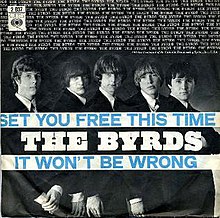
The Byrds were an American rock band formed in Los Angeles, California, in 1964. The band underwent multiple lineup changes throughout its existence, with frontman Roger McGuinn remaining the sole consistent member. Although their time as one of the most popular groups in the world only lasted for a short period in the mid-1960s, the Byrds are considered by critics to be among the most influential rock acts of their era. Their signature blend of clear harmony singing and McGuinn's jangly 12-string Rickenbacker guitar was "absorbed into the vocabulary of rock" and has continued to be influential.

Ballad of Easy Rider is the eighth album by the American rock band the Byrds and was released in November 1969 on Columbia Records. The album was named after the song "Ballad of Easy Rider", which had been written by the Byrds' guitarist and singer, Roger McGuinn, as the theme song for the 1969 film, Easy Rider. The title was also chosen in an attempt to capitalize on the commercial success of the film, although the majority of the music on the album had no connection with it. Nonetheless, the association with Easy Rider heightened the Byrds' public profile and resulted in Ballad of Easy Rider becoming the band's highest charting album for two years in the U.S.
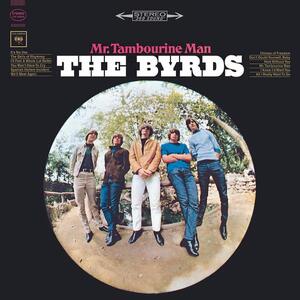
Mr. Tambourine Man is the debut studio album by the American rock band the Byrds and was released on June 21, 1965, by Columbia Records. The album is characterized by the Byrds' signature sound of Jim McGuinn's 12-string Rickenbacker guitar and the band's complex harmony singing. The material on the album mostly consists of cover versions of folk songs, primarily composed by Bob Dylan, and originals written or co-written by singer Gene Clark. Along with the Dylan-penned single of the same name, Mr. Tambourine Man established the band as an internationally successful act and is widely regarded by critics as representing the first effective American challenge to the chart dominance of the Beatles and other British Invasion bands during the mid-1960s.

Turn! Turn! Turn! is the second studio album by American rock band the Byrds, released on December 6, 1965, by Columbia Records. Like its predecessor, Mr. Tambourine Man, the album epitomized the folk rock genre and continued the band's successful mix of vocal harmony and jangly twelve-string Rickenbacker guitar. The album's lead single and title track, "Turn! Turn! Turn!", which was adapted by Pete Seeger from text in the Book of Ecclesiastes, had previously been arranged in a chamber-folk style by the Byrd's lead guitarist Jim McGuinn for folk singer Judy Collins' third album, but the arrangement he used for the Byrds' recording of the song utilizes the same folk-rock style as the band's previous hit singles.

Fifth Dimension is the third album by the American rock band the Byrds and was released in July 1966 on Columbia Records. Most of the album was recorded following the February 1966 departure of the band's principal songwriter Gene Clark. In an attempt to compensate for Clark's absence, guitarists Jim McGuinn and David Crosby increased their songwriting output. In spite of this, the loss of Clark resulted in an album with four cover versions and an instrumental, which critics have described as "wildly uneven" and "awkward and scattered". However, it was the first Byrds album not to include any songs written by Bob Dylan, whose material had previously been a mainstay of the band's repertoire.

The Byrds' Greatest Hits is the first greatest hits album by the American rock band the Byrds and was released in August 1967 on Columbia Records. It is the top-selling album in the Byrds' catalogue and reached number 6 on the Billboard Top LPs chart, but failed to chart in the UK.

Dr. Byrds & Mr. Hyde is the seventh studio album by the American rock band the Byrds and was released in March 1969 on Columbia Records. The album was produced by Bob Johnston and saw the band juxtaposing country rock material with psychedelic rock, giving the album a stylistic split-personality that was alluded to in its title. It was the first album to feature the new band line-up of Clarence White (guitar), Gene Parsons (drums), John York (bass), and founding member Roger McGuinn (guitar). Dr. Byrds & Mr. Hyde is unique within the band's discography for being the only album on which McGuinn sings the lead vocal on every track.
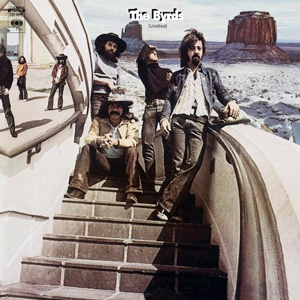
(Untitled) is the ninth album by the American rock band the Byrds and was released in September 1970 on Columbia Records. It is a double album, with the first LP featuring live concert recordings from early 1970, and a second disc consisting of new studio recordings. The album represented the first official release of any live recordings by the band, as well as the first appearance on a Byrds' record of new recruit Skip Battin, who had replaced the band's previous bass player, John York, in late 1969.

Byrds is the twelfth and final studio album by the American rock band the Byrds and was released in March 1973 on Asylum Records. It was recorded as the centerpiece of a reunion among the five original band members: Roger McGuinn, Gene Clark, David Crosby, Chris Hillman, and Michael Clarke. The last time that all five members had worked together as the Byrds was in 1966, prior to Clark's departure from the band. During the reunion, the current, latter-day lineup of the band continued to make live appearances until February 1973, with McGuinn being the only member common to both versions of the group.
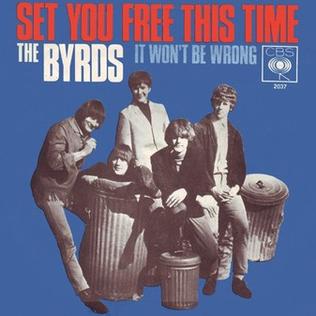
"Set You Free This Time" is a song by the American folk rock group the Byrds, written by band member Gene Clark. It was first released in December 1965 on the group's Turn! Turn! Turn! album, and later issued as a single in January 1966.

"5D (Fifth Dimension)" is a song by the American rock band the Byrds, written by band member Jim McGuinn. It was released as a single in June 1966, and also included as the title track on the Byrds' third album, Fifth Dimension.
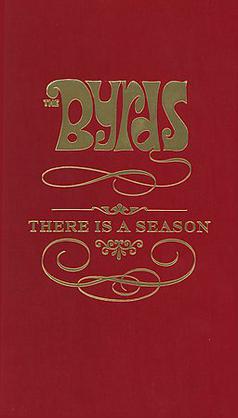
There Is a Season is a four-CD and one DVD box set by the American rock band the Byrds that was released on September 26, 2006 by Columbia/Legacy. It comprises 99 tracks and includes material from every one of the band's twelve studio albums, presented in roughly chronological order. The bonus DVD features ten clips of the Byrds lip-synching their hits on television programs between 1965 and 1967. Upon release, the box set failed to reach the Billboard 200 chart or the UK Albums Chart. There Is a Season supplants the band's earlier box set, The Byrds, which was released in October 1990.
"Ballad of Easy Rider" is a song written by Roger McGuinn, with input from Bob Dylan, for the 1969 film Easy Rider. The song was initially released in August 1969 on the Easy Rider soundtrack album as a Roger McGuinn solo performance. It was later issued in an alternate version as a single by McGuinn's band the Byrds on October 1, 1969. Senior editor for Rolling Stone magazine, David Fricke, has described the song as perfectly capturing the social mood of late 1969 and highlighting "the weary blues and dashed expectations of a decade's worth of social insurrection".
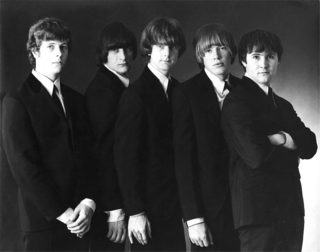
The Byrds were an American rock band formed in Los Angeles, California in 1964. The bulk of the band's releases were issued on Columbia Records or its subsidiaries, except their final studio album, Byrds, and its associated singles, which Asylum Records released in 1973. Before signing a recording contract with Columbia, the band released a single with Elektra Records in 1964 under the name the Beefeaters.

"Have You Seen Her Face" is a song by the American rock band the Byrds, written by the group's bass player Chris Hillman and included on their 1967 album Younger Than Yesterday.

Preflyte is a compilation album by the American folk rock band the Byrds and was released in July 1969 on Together Records. The album is a collection of demos recorded by the Byrds at World Pacific Studios in Los Angeles during late 1964, before the band had signed to Columbia Records and become famous. It includes early demo versions of the songs "Here Without You", "You Won't Have to Cry", "I Knew I'd Want You", and "Mr. Tambourine Man", all of which appeared in re-recorded form on the band's 1965 debut album.
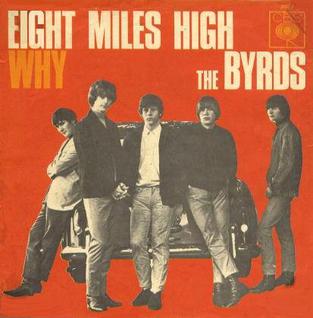
"Why" is a song by the American rock band the Byrds, written by David Crosby and Jim McGuinn and first released as the B-side of the band's "Eight Miles High" single in March 1966. The song was re-recorded in December 1966 and released for a second time as part of the band's Younger Than Yesterday album.

Never Before is a compilation album by the American rock band the Byrds, consisting of previously unreleased outtakes, alternate versions, and rarities. It was initially released by Re-Flyte Records in December 1987 and was subsequently reissued on CD in 1989, with an additional seven bonus tracks.

In the Beginning is a compilation album by the American folk rock band the Byrds and was released in August 1988 by Rhino Records. It features demo recordings made during 1964, before the band became famous.

"She Don't Care About Time" is a song by American folk rock band the Byrds. It was released on a non-album single in October 1965, as the B-side to "Turn! Turn! Turn!". The song was written by Gene Clark, the Byrds' main songwriter between 1964 and early 1966. "She Don't Care About Time" was recorded during sessions for the group's second album Turn! Turn! Turn!. The song is on most of the band's hits compilations.

